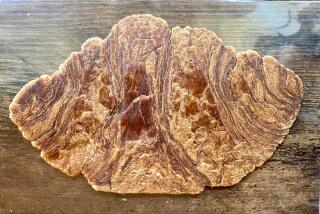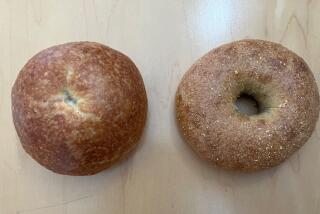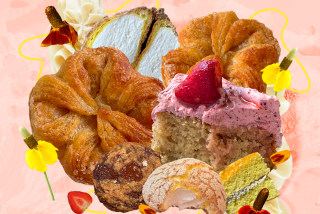Op-Ed: Are your values under assault? Bake a pie
I’m a food obsessive, but for the last year I’ve found that an unthinking focus on deliciousness makes me flinch. My Twitter feed whiplashes between social outrage and, yay, ice cream! Not that there’s anything wrong with ice cream, but how important is talking about it in a world where all your values are under assault? I teach people how to make pie, but even to me, an advocate for flaky pastry, sharing a love of baking sometimes feels like fiddling while Rome burns.
And yet, this time of year, we will bake pies.
One of the standards I see under siege is inclusion. And one explanation for the overall assault is an anger traceable to the decline in manufacturing and the concomitant markdown on human labor. As Wendell Berry asked in “What Are People For?”: Isn’t our human genius our ability to use the resources around us to create what we need? Something’s lost when our capacity to transform things is less valued than the extra dollar that results from that labor.
I’m here to say inclusion is pretty much my motto as a cook (and a person), and good crust is an ode to the worth of humans and what we can accomplish.
In pie we find common ground, purpose and some mighty fine eating.
To learn pie making, you have to acknowledge failure and be open to help. It’s good to work with someone experienced, which may mean reaching out to someone new, someone who has the knowledge you need. If you have nothing else in common, you’ll share a desire to be good at a seemingly banal task. (Banal because it’s often seen as women’s handwork, a cute throwback in a time when what we eat is outsourced, made far from hands we know.)
You will go through a series of steps that take time, a process to which you must surrender. You will have to practice.
Measure flour, weigh butter and rub the two together aware that how you do it will define the flakiness of the dough. Add icy water. Too much will give you a tough result, so drizzle it in. Lightly shape it into a disc; too much handling and again toughness will be the result.
Then chill, literally. Wait for the dough to rest. Prepare the filling — let’s say pumpkin custard. In half an hour, give or take, the dough is ready to roll out. If you’ve practiced, your hands will make efficient use of the elemental rolling pin.
Before too long the dough can be laid into the pan, the filling added, the edges fluted. The pie goes into the oven and again you wait.
The eater is aware only of the result, the product. But for you, the solace of the task — repeated by pie makers innumerable times for hundreds of years — is as much the point as the comfort of eating. You are a link in a chain of humans who craft what they need to survive, with ingenuity and elegance.
At Thanksgiving, the invisible threads that bind us together are almost tangible. This year, when those threads are especially frayed, cooking can repair the ragged edge and nurture us for the wrangling ahead. Kind of like a time of truce, a pause in the battle.
So back to the pie. If it is your first (or second or third), don’t expect perfection. An imperfect pie will not lack an appreciative audience. It is enough to make a real thing in the here and now — flour, butter, hands, mouth, smiles. Give thanks for the opportunity to practice the craft, to put aside rancor and hopelessness. In pie we find common ground, purpose and some mighty fine eating.
Evan Kleiman ran Angeli Caffe in L.A. for 27 years. She is the longtime host of KCRW-FM’s “Good Food.”
Follow the Opinion section on Twitter @latimesopinionand Facebook
More to Read
A cure for the common opinion
Get thought-provoking perspectives with our weekly newsletter.
You may occasionally receive promotional content from the Los Angeles Times.






